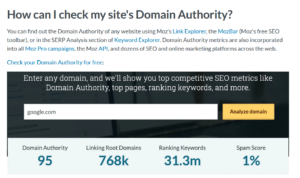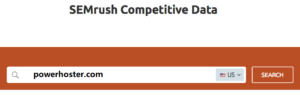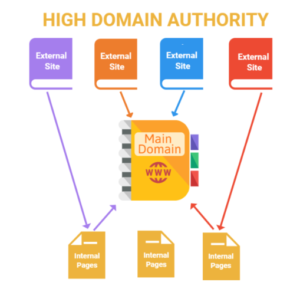Domain Authority (DA) is a metric developed by the SEO software company Moz that predicts how well a website will rank on search engine result pages (SERPs).

It’s a score that ranges from 1 to 100, with higher scores indicating a greater ability to rank. Here are some key points to understand about Domain Authority:
- Calculation: DA is calculated using a machine learning algorithm that analyzes multiple factors, including the number of linking root domains, the number of total links, and the quality of those links. It takes into account more than 40 different signals.
- Scoring: The scoring is logarithmic, meaning it’s much easier to improve your score from 20 to 30 than from 70 to 80. This is because higher scores require significantly more effort and high-quality backlinks.
- Purpose: DA is used to compare websites and track the “ranking strength” of a domain over time. It’s not used by Google in its ranking algorithm but is a useful comparative metric for SEO professionals.
- Factors Influencing DA:
- Link Profile: Quality and quantity of inbound links.
- Root Domains: The number of unique domains linking to your site.
- Content Quality: High-quality, relevant content that attracts links.
- Site Structure: Good internal linking and overall site architecture.
- Use in SEO: SEO professionals use DA to assess the competitive landscape of their niche. For instance, if your competitors have a higher DA, you might need to build more high-quality backlinks and improve your site’s content and structure to compete effectively.
- Comparison with Other Metrics: Other similar metrics include Ahrefs’ Domain Rating (DR) and SEMrush’s Authority Score. While all these metrics aim to measure the same concept, they use different methods and data sources, so scores may vary across different tools.
What is a good Domain Authority Score?
A “good” Domain Authority (DA) score can be subjective and relative, depending largely on the competitive landscape of your industry and the DA scores of your competitors. However, here are some general guidelines:
- Relative Measure:
- Competitors’ Scores: A good DA score is one that is comparable to or higher than your main competitors. For example, if your competitors have DA scores ranging from 30 to 40, a DA score within or above this range would be considered good.
- Score Ranges:
- 1-20: Low DA. New websites or those with minimal backlink profiles typically fall into this range. While this range indicates the need for significant improvement, it’s also where smaller niche sites may naturally reside.
- 21-40: Average DA. These sites have some authority and a growing backlink profile. They may compete in less competitive niches or be in the process of building their SEO efforts.
- 41-60: Strong DA. Websites in this range are considered to have good authority and are likely to rank well for moderately competitive keywords. These sites have established a strong backlink profile and produce high-quality content.
- 61-80: Very Strong DA. Sites with DA scores in this range are typically authoritative and well-established. They compete for highly competitive keywords and have a robust backlink profile.
- 81-100: Exceptional DA. These are the most authoritative sites on the web, such as major news outlets, large educational institutions, and well-known brands. They dominate competitive search terms and have an extensive, high-quality backlink profile.
- Contextual Factors:
- Industry: In some industries, even a DA of 20-30 might be very competitive, while in others, you might need a DA of 50+ to stand out.
- Niche: Smaller, highly specific niches may have lower average DA scores, making it easier to achieve a “good” score relative to the competition.
- Growth and Improvement:
- Progress Over Time: A good DA score is also one that shows consistent growth over time. If your DA is steadily increasing as you implement SEO strategies, you’re on the right track, regardless of the specific number.
In summary, while higher DA scores generally indicate stronger ranking potential, the definition of a “good” DA score depends on your specific industry, niche, and competitive environment. Comparing your DA to that of your direct competitors and tracking your progress over time are key to understanding the effectiveness of your SEO efforts.
Why Domain Authority Matters?
Domain Authority (DA) matters for several reasons, particularly in the context of search engine optimization (SEO) and digital marketing. Here are the key reasons why DA is important:
- Competitive Analysis:
- Benchmarking: DA allows you to benchmark your website against competitors. By understanding where your site stands in relation to others, you can develop targeted strategies to improve your ranking potential.
- Identifying Opportunities: By analyzing the DA of competitor sites, you can identify gaps and opportunities in your SEO strategy, such as areas where you might need to build more high-quality backlinks.
- SEO Strategy:
- Link Building: Higher DA often correlates with better link quality and quantity. Focusing on increasing your DA can guide your link-building efforts, helping you to acquire backlinks from authoritative sites that can boost your search engine rankings.
- Content Strategy: Knowing your DA helps in planning and optimizing your content. High-quality, relevant content attracts more links, which in turn can improve your DA.
- Predictive Power:
- SERP Performance: Although DA is not a direct ranking factor used by Google, it strongly correlates with a website’s ability to rank well in search engine results. Websites with higher DA scores generally perform better in SERPs, making DA a useful predictive tool.
- Traffic Estimation: Higher DA can lead to better rankings and more organic traffic. Understanding your DA can help you estimate potential traffic and set realistic SEO goals.
- Link Building and Partnerships:
- Outreach: When reaching out for guest posts, collaborations, or backlinks, having a high DA makes your site more attractive to potential partners.
- Evaluating Prospects: DA helps in assessing the quality of potential linking domains. By targeting sites with higher DA, you can secure more valuable backlinks.
- Tracking Progress:
- SEO Performance: Monitoring your DA over time helps you track the effectiveness of your SEO efforts. An increasing DA indicates successful SEO strategies, while a stagnant or decreasing DA might signal the need for adjustments.
- Reporting: DA provides a quantifiable metric that can be included in SEO reports to demonstrate progress and justify investments in SEO activities.
- Brand Credibility and Trust:
- Authority and Trustworthiness: A high DA score contributes to the perception of your site as an authority in your niche, enhancing your brand’s credibility and trustworthiness among users and potential partners.
How to Improve Domain Authority (DA) ?
Improving Domain Authority (DA) involves enhancing various aspects of your website and overall SEO strategy. Here are some effective ways to improve your DA:
- Build High-Quality Backlinks:
- Guest Posting: Write high-quality guest posts for reputable websites in your niche. Ensure the content is valuable and includes a link back to your site.
- Broken Link Building: Find broken links on other websites and suggest your content as a replacement. Tools like Ahrefs and Moz can help identify these opportunities.
- Content Outreach: Reach out to influencers and bloggers in your industry to share your content. If your content is valuable and relevant, they might link to it.
- Create Link-Worthy Content:
- In-Depth Guides and Tutorials: Comprehensive, detailed guides attract more links because they serve as valuable resources.
- Infographics: Visual content like infographics often gets shared and linked to more frequently than text-based content.
- Original Research and Data: Publish unique research, case studies, or data analysis that others in your industry will find useful and want to link to.
- Improve On-Page SEO:
- Optimize Content: Use relevant keywords naturally, ensure proper use of heading tags (H1, H2, etc.), and include meta descriptions and alt text for images.
- Internal Linking: Create a robust internal linking structure to distribute page authority across your site and help search engines understand the importance of different pages.
- User Experience (UX): Improve site speed, mobile-friendliness, and overall user experience. A well-structured site with easy navigation encourages users to stay longer, reducing bounce rates.
- Technical SEO Enhancements:
- Site Speed: Improve your site’s loading speed using tools like Google PageSpeed Insights. Fast-loading sites are favored by both users and search engines.
- Mobile Optimization: Ensure your website is mobile-friendly. Use responsive design to provide a good user experience on all devices.
- Secure Your Site: Use HTTPS to secure your website. Search engines favor secure sites, and it helps build trust with your audience.
- Remove Toxic Backlinks:
- Audit Your Backlink Profile: Use tools like Moz, Ahrefs, or SEMrush to identify low-quality or spammy backlinks.
- Disavow Toxic Links: If you find harmful backlinks, use Google’s Disavow Tool to prevent them from negatively affecting your DA.
- Engage in Social Media:
- Share Content: Regularly share your content on social media platforms to increase its reach and the likelihood of earning backlinks.
- Build a Community: Engage with your audience on social media to build relationships and encourage sharing of your content.
- Consistency and Patience:
- Regular Updates: Keep your website updated with fresh content and regularly optimize existing content.
- Long-Term Strategy: Improving DA is a long-term process. Consistently apply SEO best practices and be patient as changes take time to reflect in your DA score.
By implementing these strategies, you can enhance your site’s authority, improve its ability to rank in search engine results, and ultimately increase your Domain Authority.






